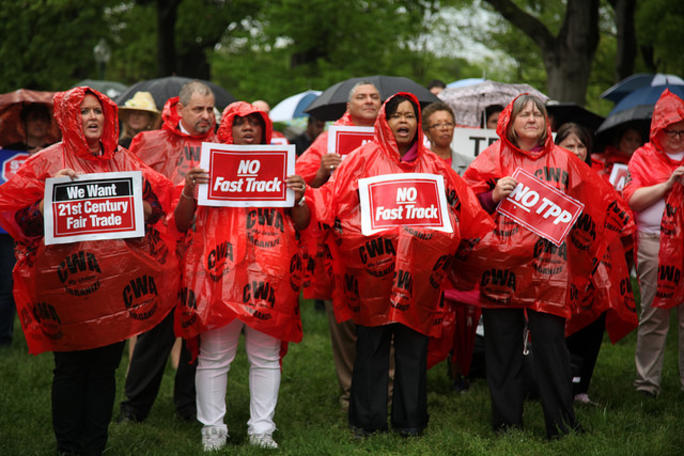
WASHINGTON – One thing has become clear to worker advocates analyzing the proposed Trans Pacific Partnership (TPP) trade agreement: if it is enacted as written, it will give corporations and banks a way to undermine or ignore any and all regulations member nations have put in place to protect consumers and workers.
Under the version of the TPP being promoted by the White House, if investors somehow feel that their “expectations” for profit levels are threatened by a signatory nation’s regulations or laws, they could go to an Investor-State Dispute Settlement (ISDS) tribunal. The decisions of the tribunal would supersede national laws and could not be appealed.
Through ISDS systems currently being used to enforce trade agreements, corporations have the same power as sovereign governments. Representatives of corporations come before a tribunal, as do representatives of governments. The former attacks and the latter defends regulations.
Observers agree: the tribunals are stacked in favor of corporations and banks.
They consist of three private attorneys who are not accountable to any electorate. More often than not, tribunal members rotate between serving as judges and bringing cases for corporations against governments. Such conflicts of interest are unethical in most legal systems, but ISDS tribunals are not bound by precedents or the opinions of courts.
ISDS tribunals are nothing new. They have been part of almost every international trade agreement since the 1960s, including NAFTA.
The tribunal connected to the proposed TPP is different, however. It has the potential for giving more power to more corporations and banks than any other ISDS in history because the TPP includes more nations than any other trade agreement in history.
Moreover, the TPP comes at a time when corporations and banks are controlling more and more of the global economy.
According to Global Trade Watch, between 1960 and 1990, corporations brought some 50 cases to various ISDS tribunals. However, corporations initiated at least 50 cases each year from 2011-2013; 42 in 2014.
If a tribunal rules against a government, there is no limit to the amount of money it can order the government to fork over to the complaining corporation. Such compensation orders are based on the “expected future profits” an ISDS tribunal figures that an investor would have earned if the policy in question did not exist.
All these policies relate to environmental concerns, energy use, financial regulations, public health protections, transportation development and land use.
Overall, in the past few years, tribunals have ordered the U.S, government to award more than $3.6 billion in “compensation” to investors.
Even when governments win cases, ISDS tribunals often order them to pay up to $8 million toward the tribunal’s costs. This adds up and can create a chilling effect on government policymaking and enforcement.
Give-aways to money manipulators
According to President Obama, a central goal of the TPP is to ensure that US-based financial companies are able to sell their services in foreign markets. This has led many experts to be concerned that through the TPP, corporations that manipulate money will be allowed to run amok.
Currently, financial institutions have been reined in by the Dodd-Frank law, which was passed to prevent them from causing another recession like they did in 2008. Among other things, Dodd-Frank regulations make it impossible for a financial institution to become “too big to fail.” The rules also make it illegal for banks to use depositors’ money in stock market gambles.
Big financial institutions have been trying to shake loose from Dodd-Frank almost from the day the law was enacted. They will have the opportunity to make their wish come true if the TPP passes. They could go before an ISDS tribunal and claim that Dodd-Frank regulations prevent them from making their “expected” profit.
Chances are, an ISDS tribunal would free the money manipulators from any limitations on their operations.
That’s why the American Insurance Association, Citigroup, Goldman Sachs, and Morgan Stanley have formed the “U.S. Coalition for the TPP.”
A long way to go.
The American people can take some hope from the fact that there’s a long way to go before the can TPP be enacted.
After six years of secret negotiations, the White House two weeks ago sent a proposed draft of the TPP to Congress, which now has 90 days to study the measure. (The first 30 must be spent consulting with the Administration.)
Then the full trade deal will be open for anyone to review for 60 days, allowing feedback from the public.
Next, the U.S. International Trade Commission has up to 105 days to complete a full review and make recommendations, which is sent to Congress. There, lawmakers will craft a bill to implement the TPP and will have 90 days to vote the bill up or down.
Because of the upcoming presidential elections, lawmakers might be more inclined than usual to act in the public interest in order to win votes. They might greatly modify TPP provisions or defeat it altogether.
Hope springs eternal.
Photo: AFL-CIO NOW blog.












Comments